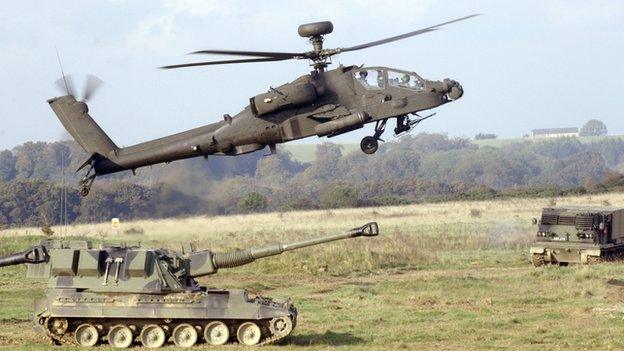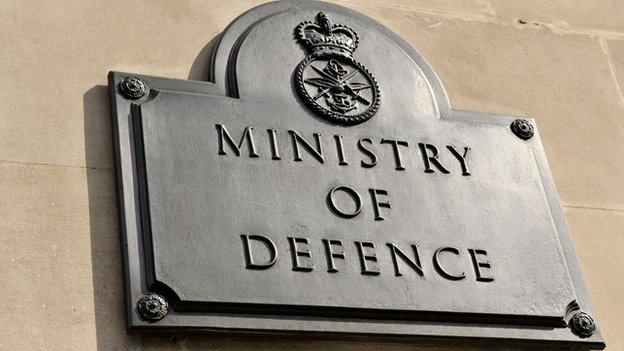Lobbyists 'delaying Apache contract'
- Published

A £1bn Army contract to replace its Apache attack helicopters has been delayed due to lobbying by the firm AgustaWestland, Whitehall insiders say.
The BBC has learned the MoD wants to buy a replacement from US firm Boeing, which is offering a cheaper deal for a joint order with other countries.
But the decision has been delayed until 2016, with the UK firm asking to be allowed to make a new bid for the work.
The delay also risks adding to the cost of running the existing Apache fleet.
The dilemma of giving work to a British firm or buying a much cheaper option is much like the one that occurred back in 1995 when the current generation of attack helicopters was bought.
Then the government opted for a contract with Westland that involved fitting the basic American helicopter with new engines, defensive aids and communications, taking its price from around £20m each to £44m per aircraft.
Lt Gen Gary Coward, head of the Joint Helicopter Command from 2005 to 2008, told Newsnight that the earlier Westland deal "cost an awful lot of time and an awful lot of money".
Newsnight understands that Boeing's current offer to the British government is, once again, around £20m per helicopter, which presents the MoD with an opportunity almost unique in defence procurement history, to buy a new weapon for a fraction of the price of the one it is replacing.
Lt Gen Coward says "there really is no choice" now and that Boeing's offer "is the only sensible option".
Yet, although the MoD made its recommendation to No 10 in October last year, stating a preference for the Boeing option, the order has been held up following representations to Downing Street by AgustaWestland.
Newsnight has been told that the order cannot go ahead until "after the election" because of the political sensitivities of opting for an off-the-shelf buy from Boeing.
Former defence secretary Geoff Hoon, who now runs AgustaWestland's international business division, has been part of the lobbying effort.
'Capability gap' fears
The delays could be very expensive. American suppliers will its support of the equipment carried in the Army's current generation of WAH-64 Apaches in 2017, adding greatly to the costs of maintaining the existing fleet.
And Boeing's offer price to the UK is conditional on it joining an imminent, much larger, order for the US Army.
Even if an order were placed immediately after the election, the aircraft would not enter service before 2020. The Army fears a "capability gap" and rising costs as support for the existing plane is switched off from 2017 onwards.
The BBC understands that AgustaWestland has persuaded the government that it should be allowed to make a new bid for the business.
Many in the MoD fear that will provide an opportunity for "gold plating", increasing the value of the work to the Yeovil-based manufacturer.

Signing up for Boeing's project, called Block III Apache AH-64E - a batch of 240 machines to be supplied to the US and other armies - offers the advantage of being part of a large, and therefore cheaper, deal.
However, giving Boeing the contract would leave AgustaWestland short of work. Backers of the firm argue that even the off-the-shelf Boeing helicopter would need some modification, for example to its communications equipment, to make it interoperable with British forces.
The MoD is so keen on the Boeing option that it has already discussed with the Pentagon ways in which the Block III Apache order book might be kept open a little longer so that the UK can join and gain from the likely savings of being part of a bulk order.
The MoD said in a statement: "The assessment phase of the Attack Helicopter Capability Sustainment Programme, which will supply 50 latest-generation Apache helicopters to the UK, is ongoing.
"This phase includes establishing best value for money for the taxpayer and will conclude in March 2016, at which point a decision will be made as to the best procurement route."
However, the suggestion that the assessment will finish in March 2016 marks yet a further six-month delay to the project because Newsnight understands that the Joint Helicopter Command was determined to reach that milestone by September 2015.
Awarding the new contract offers the MoD a chance to make a landmark decision to put cost-effectiveness ahead of industrial interests. But the politics involved with the West Country helicopter-making business have never been easy, as previous defence secretaries can bear witness.